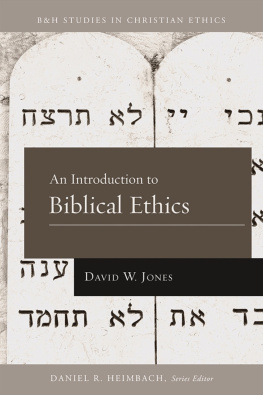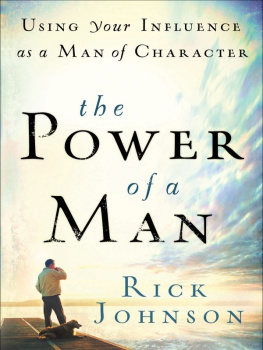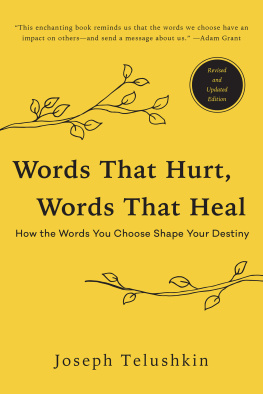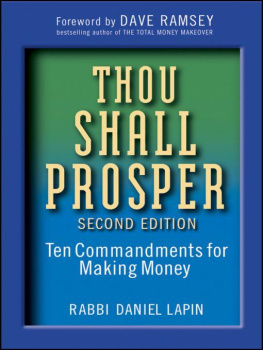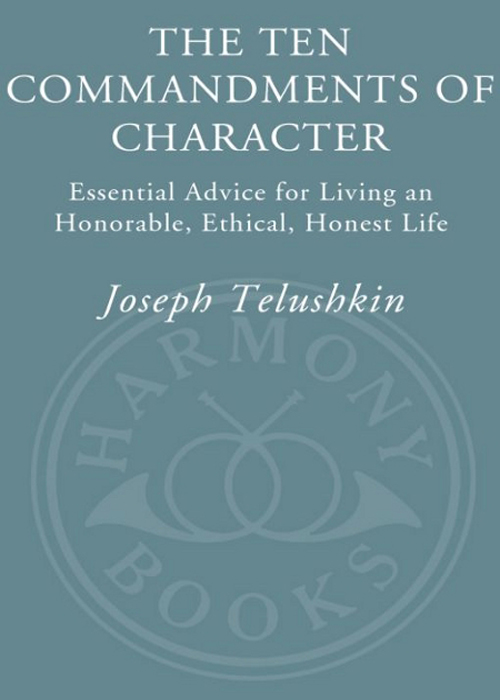
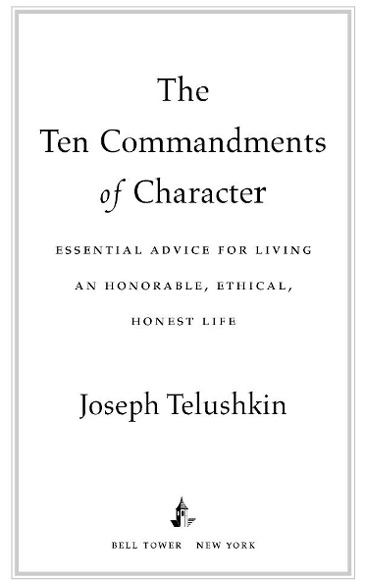
Table of Contents
To our beloved friend Annie Fox,
who is a perpetual source of heavenly advice
Acknowledgments

I am pleased to have the opportunity to publicly thank Steve Waldman, the creator of Beliefnet.com, who first developed with me the idea for an ethics advice column. Steves passion for Beliefnet, and for making available to Americans of all and no religious denominations the insights of dozens of different traditions, has served as an inspiration to me as well. I am also happy to have this chance to thank Paul ODonnell, my editor at Beliefnet, for his probing, his pushing, and his consistently insightful comments.
David Szonyi, my friend and freelance editor, has worked with me on my last eight books and, as I have often commented, is a blessing to any writer lucky enough to work with him.
There are two other people whom I would like to thank together: Richard Pine, agent extraordinaire, and Toinette Lippe, editor extraordinaire. I have been working with Richard for more than twenty years, and with Toinette for just a few, but they are models of friendship, inspiration, and talent, and both are people of utter integrity. I thank God that they are in my life.
Preface

As a rabbi, I am heir to a long-standing tradition of advice-giving. Perhaps the Torahs most famous piece of advice was offered in Gods name by Moses, near the end of his life: I have put before you life and death, blessing and curse. Choose life (Deuteronomy 30:19). As we witness case after case of suicide bombing by Palestinian terrorists, or as we remember the nineteen hijackers who struck America on September 11, 2001, we see how difficult it still is for many people to follow the Bibles life-affirming advice.
Several centuries after Moses, when the prophet Samuel was asked by the Israelites to appoint a king, he used all his powers of persuasion to try to dissuade them from instituting a monarchy. He warned them that a king would draft their sons for his own glory or profit (such as fighting his battles or plowing his fields), while their daughters would be put to work as his cooks and bakers. A king would confiscate land and give it to his confederates, and his subjects eventually would become his slaves (1 Samuel 8:17). The Israelites ignored Samuels adviceperhaps the earliest, most penetrating critique in any literature of the injustices perpetrated by kingsand thus suffered the fate that Samuel had predicted.
The biblical book of Proverbs (attributed by tradition to King Solomon) is a compendium of advice, which details, among other things, the importance of avoiding bad company (1:1019; 4:1419), being honest in business (3:28), and not being lazy (6:611), and even the character traits to look for in a spouse (31:10 ff.).
A thousand years later, the most widely studied book of the Talmud, the Ethics of the Fathers, was compiled. Like Proverbs, this is a compilation of advice, but it is worded in a more practical format. Known in Hebrew as Pirkei Avot, the book contains the favorite aphorisms and life lessons of leading rabbis over a period of about four centuries. There you will find many gems that I have passed on to people in this book. They include Hillels admonition against being too selflessIf I am not for myself, who will be for me?balanced by his warning against becoming egocentricAnd if I am only for myself, what am I? For an example of how these words should influence our charitable giving and the causes that we should support.
There are two more traditions of advice-giving in Jewish religious writings. The first comes from what is known as the Mussar literature, a body of writings and religious counsel that offers insights on how to deal with ethical problems and improve ones character. For example, Rabbi Yosef Horowitz, founder of the Navorodock school of Mussar, wryly warned his followers not to be impatient, because the process of growth is a slow one: A person wants to become a scholar and a leader overnight, and to sleep that night as well.
On one occasion, some Jews from Kovno, Lithuania, approached Rabbi Israel Salanter, the Mussar movements nineteenth-century founder, to seek his counsel. A wealthy Kovno Jew had lost all his money and eventually died of starvation. Although the men who came to Rabbi Salanter had been unaware of the mans desperate financial situation, they felt responsible for his death: How could a man they knew be in such dire circumstances and they remain oblivious to it? What should they do now? Rabbi Salanter advised them that they were not at fault: That man did not die of hunger. He died of pride. He should have taken charity and not allowed himself to die of hunger.
Yet another source of ethical advice in religious writings is found in what is known as the responsa literature (in Hebrew, she elot ve-teshuvot, questions and answers). Sometimes, when an ethical or ritual problem arose in someones life, that person would see no reference to the issue in the Bible or the codes of Jewish law. He or she would seek clarification from a rabbi, who would search out parallels or analogous cases in Jewish law.
While many responsa questions deal with issues of ritual, others confront ethical dilemmas, as in a classic eighteenth-century query directed to Rabbi Ezekiel Landau of Prague. A newly wealthy Jew had acquired an estate with forests and wanted to know whether it was permissible for him to hunt wild animals for sport, provided that he did not eat of the forbidden meat (which was not kosher). The rich man received an answer, along with a reproof: How can a Jew kill a living thing without any benefit to anyone and engage in hunting merely to satisfy the enjoyable use of his time? Rabbi Landau went on to note that while the Talmud permits slaying wild animals when they invade human settlements, it is immoral to pursue animals in their own dwelling places in the woods; such activity is sheer cruelty.
Perhaps the most famous Jewish advice column in modern times was created about a century ago in Americas largest-circulation Yiddish newspaper, the Forward (there is now an English-language Forward as well). Known as the Bintel Brief, the column originated in January 1906, and readers were invited to submit questions about ethical and personal dilemmas to the papers editors.
One early question: I am a socialist, and my boss is a fine man. I know hes a capitalist, but I like him. Am I doing something wrong? Another interesting question came from a Jew who had been in the United States only five weeks. The man had left behind in Russia a blind father, to whom he had promised to send the first money he earned in America. But he had found it more difficult than he had expected to make money: Now I want you to advise me what to do. Shall I send my father a few dollars for Passover, or should I keep the little money for myself? In this place, the work will end soon, and I may be left without a job. The question is how to deal with the situation. I will do as you tell me. The editors advised the young man to send the few dollars to his father, because, since he was so young, he would find it easier to earn a living than would his blind father in Russia.
Next page

